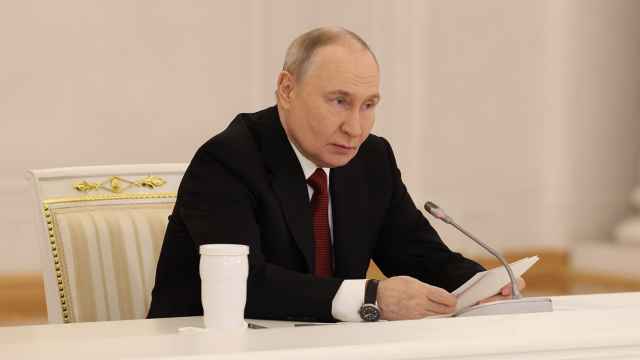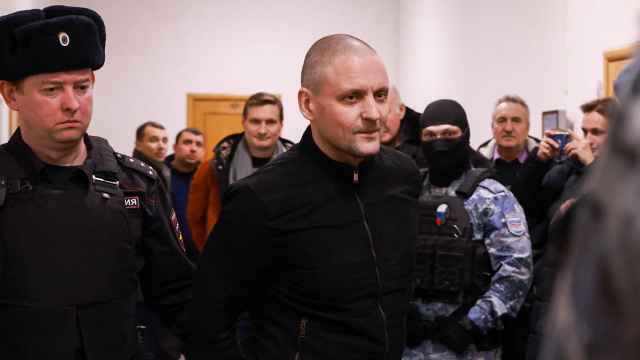State-owned Federal Grid Company said it is jettisoning contracts with companies failing to disclose their owners, just as news broke that the government has assigned the person who oversaw Rosneft's acquisition of Yukos' assets to verify the beneficiary owners of state company contractors.
Federal Grid Company, the national power distributor also known as FSK, said in a statement Tuesday that it had terminated the contracts to comply with federal government commission requirements on disclosing owners, including beneficiary owners.
In a three-paragraph statement, FSK said it had taken "necessary measures" to comply with requirements established by a commission helmed by Prime Minister Vladimir Putin, as well as by a government commission on energy-sector development.
FSK spokesman Oleg Kozlov said by e-mail that the company was referring to commissions held in December and subsequent months.
FSK sent letters to companies failing to reveal their owners "informing them of the termination of contractual agreements," FSK said. Kozlov said the letters went out Tuesday.
Kozlov said the decision to cut off the contractors "was made by the management of FSK."
The terminated contracts might total roughly 20 billion rubles ($680 million), Kommersant reported Wednesday, citing a source close to FSK. In his e-mail, Kozlov said that figure "isn't far from the truth." Answering a question about how the company will replace the contractors, he wrote that "there are a sufficient number of companies in the market that meet FSK's high demands."
The FSK spokesman wouldn't say how many companies it sent letters to and stated "each case is going to be decided individually, depending on the type of contract and the duration of the contract and in full accordance with the law."
Also on Tuesday, Medvedev proposed to his presidential anti-corruption council additions to the federal law to force officials and their family members to explain how they obtained the money for purchases of real estate, securities and vehicles, Vedomosti reported.
The law might be inhibited by a number of factors, however. An explanation of such purchases would be needed only if the purchase price exceeded a total of three years of the family's income.
What's more, purchase declarations could be withheld from the public if the government determines that they are state secrets.
Vladimir Rimsky of anti-corruption organization Indem took the news of Medvedev's proposed law with a giant grain of salt. "It's an inoperable law," he said in a telephone interview, adding that it's doubtful that prosecutors could enforce such a law.
FSK's move to terminate tens of millions of dollars in contracts also struck him as odd. "Why did they suddenly now decide to do this?" Rimsky said. FSK's Kozlov said the move wasn't made earlier because "some time, from December through March, was required to conduct the needed work with contracted companies."
Adding to this week's transparency controversies is Deputy Prime Minister Igor Sechin's appointment of staffer Anton Ustinov to follow up on state companies' compliance with disclosing their contractors' beneficial owners. Ustinov was also empowered to inspect income declarations by state companies' top managers and their relatives, Vedomosti reported, citing anonymous federal officials.
According to Vedomosti, Ustinov was "the manager" of the process of acquiring assets from Yukos, Mikhail Khodorkovsky's onetime oil behemoth, for state oil major Rosneft. In addition, Ustinov led the government's 20.5 billion ruble ($695 million) tax claim against Mikhail Gutseriyev's Russneft.
A Message from The Moscow Times:
Dear readers,
We are facing unprecedented challenges. Russia's Prosecutor General's Office has designated The Moscow Times as an "undesirable" organization, criminalizing our work and putting our staff at risk of prosecution. This follows our earlier unjust labeling as a "foreign agent."
These actions are direct attempts to silence independent journalism in Russia. The authorities claim our work "discredits the decisions of the Russian leadership." We see things differently: we strive to provide accurate, unbiased reporting on Russia.
We, the journalists of The Moscow Times, refuse to be silenced. But to continue our work, we need your help.
Your support, no matter how small, makes a world of difference. If you can, please support us monthly starting from just $2. It's quick to set up, and every contribution makes a significant impact.
By supporting The Moscow Times, you're defending open, independent journalism in the face of repression. Thank you for standing with us.
Remind me later.






